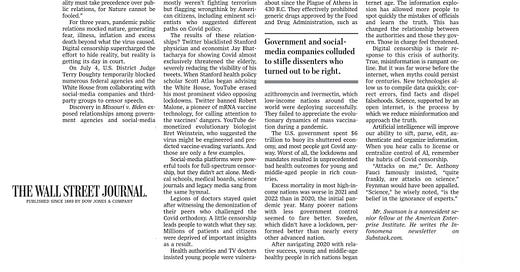Here is the full text of our Wall Street Journal op-ed – Covid Censorship Proved to Be Deadly.
Covid Censorship Proved to Be Deadly
by Bret Swanson
In the wake of the 1986 Challenger space-shuttle explosion, Nobel Prize-winning physicist Richard Feynman knew that the truth would both fuel progress and soothe the nation’s sorrow. “For a successful technology,” he said, “reality must take precedence over public relations, for Nature cannot be fooled.”
For three years, pandemic public relations mocked nature, generating fear, illness, inflation and excess death beyond what the virus caused. Digital censorship supercharged the effort to hide reality, but reality is getting its day in court.
On July 4, U.S. District Judge Terry Doughty temporarily blocked numerous federal agencies and the White House from collaborating with social-media companies and third-party groups to censor speech.
Discovery in Missouri v. Biden exposed relationships among government agencies and social-media firms and revealed an additional layer of university centers and self-styled disinformation watchdogs and fact-checking outfits.
Elon Musk’s release of some of Twitter’s internal files revealed that up to 80 Federal Bureau of Investigation agents were embedded with social-media companies. The agents mostly weren’t fighting terrorism but flagging wrongthink by American citizens, including eminent scientists who suggested different paths on Covid policy.
The results of these relationships? Twitter blacklisted Stanford physician and economist Jay Bhattacharya for showing Covid almost exclusively threatened the elderly, severely reducing the visibility of his tweets. When Stanford health policy scholar Scott Atlas began advising the White House, YouTube erased his most prominent video opposing lockdowns. Twitter banned Robert Malone, a pioneer of mRNA vaccine technology, for calling attention to the vaccines’ dangers. YouTube demonetized evolutionary biologist Bret Weinstein, who suggested the virus might be engineered and predicted vaccine-evading variants. And those are only a few examples.
Government and social-media companies colluded to stifle dissenters who turned out to be right.
Social-media platforms were powerful tools for full-spectrum censorship, but they didn’t act alone. Medical schools, medical boards, science journals and legacy media sang from the same hymnal.
Legions of doctors stayed quiet after witnessing the demonization of their peers who challenged the Covid orthodoxy. A little censorship leads people to watch what they say. Millions of patients and citizens were deprived of important insights as a result.
Health authorities and TV doctors insisted young people were vulnerable, demanded toddlers wear masks, closed schools, beaches and parks, and were loath to contemplate crucial cost-benefit analysis. The economy? Mental health? Never heard of them.
These “experts” denied the protective effects of recovered immunity, a phenomenon we’ve known about since the Plague of Athens in 430 B.C. They effectively prohibited generic drugs approved by the Food and Drug Administration, such as azithromycin and ivermectin, which low-income nations around the world were deploying successfully. They failed to appreciate the evolutionary dynamics of mass vaccination during a pandemic.
The U.S. government spent $6 trillion to buoy its shuttered economy, and most people got Covid anyway. Worst of all, the lockdowns and mandates resulted in unprecedented bad health outcomes for young and middle-aged people in rich countries.
Excess mortality in most high-income nations was worse in 2021 and 2022 than in 2020, the initial pandemic year. Many poorer nations with less government control seemed to fare better. Sweden, which didn’t have a lockdown, performed better than nearly every other advanced nation.
After navigating 2020 with relative success, young and middle-age healthy people in rich nations began dying in unprecedented numbers in 2021 and 2022. Health authorities haven’t focused enough on this cataclysm of premature death from non-Covid heart attacks, strokes, pulmonary embolisms, kidney failure and cancer.
Hiding these and other realities has become more difficult in the internet age. The information explosion has allowed more people to spot quickly the mistakes of officials and learn the truth. This has changed the relationship between the authorities and those they govern. Those in charge feel threatened.
Digital censorship is their response to this crisis of authority. True, misinformation is rampant online. But it was far worse before the internet, when myths could persist for centuries. New technologies allow us to compile data quickly, correct errors, find facts and dispel falsehoods. Science, supported by an open internet, is the process by which we reduce misinformation and approach the truth.
Artificial intelligence will improve our ability to sift, parse, edit, authenticate and organize information. When you hear calls to license or centralize control of AI, remember the hubris of Covid censorship.
“Attacks on me,” Dr. Anthony Fauci famously insisted, “quite frankly, are attacks on science.” Feynman would have been appalled. “Science,” he wisely noted, “is the belief in the ignorance of experts.”
Mr. Swanson is a nonresident senior fellow at the American Enterprise Institute. He writes the Infonomena newsletter on Substack.com.





Great op-ed. I'm so glad the WSJ published this.
Here's my latest piece on the Censorship Industrial Complex and the "Facebook Files." Facebook openly admits what they are doing. They are proud of what they are doing ... And I don't think they are afraid of Rep. Jordan's Censorship Committee either.
https://billricejr.substack.com/p/i-hope-americans-read-just-one-paragraph
Late to the party here, yet I'm only the second person to comment. This reflective accounting of how the authorities acted to censor during the pandemic deserves much higher exposure. It's too bad the issue itself turned into a left-right battle (though no surprise). That independent thinkers and writers who question dominant narratives can be essentially banned is flat-out wrong.